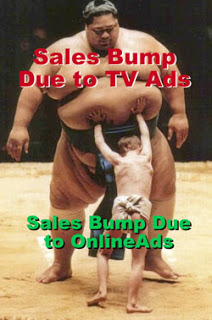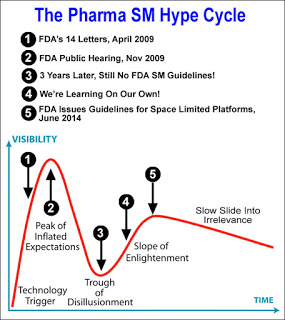Practically every print and TV direct-to-consumer (DTC) ad prominently includes the statement “Ask Your Doctor if [BRAND X] is Right for You!”
Advertisers call this the “Call to Action,” which is the linchpin of all advertising; i.e., get your target audience off its butt to take the next step toward the purchase of your brand!
Several studies have shown that this call to action of old-fashioned print and broadcast Rx DTC advertising works.
In 2003, for example, the FDA released preliminary results from a physician survey it conducted (see “Results from FDA Physician Survey on DTC Advertising“). The survey profiled 250 GP’s and 250 specialists (dermatology, allergy/pulmonology, endocrinology, and psychiatry) from a random sample of the AMA Physician Masterfile, which includes a list of all U.S. medical school graduates.
One question the FDA survey asked was:
“Think about the most recent interaction you’ve had with a patient … Can you think of a patient who initiated a discussion about a prescription drug they saw advertised?”
Ninety-two percent (92%) of the physicians surveyed said “Yes”.
This is important because doctors gave prescriptions 75% of the time to patients who asked for one.
Meanwhile, only 37% of physicians have fielded patient requests for specific meds fueled by information a patient saw in social media marketing, including disease awareness campaigns, according to a custom survey of 1,417 physicians by Sermo for FiercePharmaMarketing (here).
Why the difference? Does it mean that social media is irrelevant for pharma marketing as I suggested a few days ago (“The Irrelevance of Social Media for Pharma Marketing“)?
The FDA physician study was done way BEFORE the social media age (before Facebook was even a glimmer in Zuckerberg’s eye). At that time Rx DTC advertising was only 4 or 5 years old (FDA facilitated such advertising in 1997 when it allowed a brief summary of side effects in ads).
Now we’re more than 10 years into the social media age (which I peg to have begun in 2005 when Facebook and Blogs reached the masses) and most doctors are still not fielding many patient requests for specific meds fueled by information a patient saw in social media marketing.
But that’s understandable given the fact that not much branded Rx drug marketing is done via social media despite many calls from consultants to do so (read, for example, “It’s Time for Pharma to Get on the Facebook Brandwagon, Says @zdunnhealth“).
Which means that the “ROI” (e.g., “ask your doctor” requests followed by prescription writing) just isn’t there yet for social media Rx marketing.










![6 Digital Tools at the Center of Healthcare Digitalization [INFOGRAPHIC]](http://ec2-54-175-84-28.compute-1.amazonaws.com/pharma-mkting.com/wp-content/uploads/2021/04/6DigitalTools_600px-100x70.jpg)




